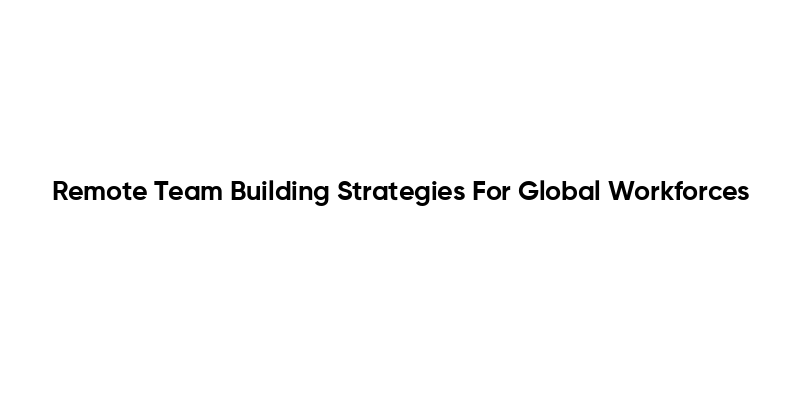In today’s interconnected world, remote team building strategies for global workforces have become essential for fostering collaboration and enhancing productivity. As organizations expand their reach across borders, the need for effective communication and team cohesion has never been more critical. This article delves into innovative approaches that can help bridge the gap between remote team members, ensuring that distance does not hinder teamwork and engagement.
Throughout this article, you will discover a variety of remote team building strategies tailored specifically for global teams. From virtual icebreakers to collaborative online tools, we will explore methods that not only strengthen relationships but also promote a sense of belonging among team members. Additionally, we will discuss the importance of cultural awareness and how it can significantly impact team dynamics in a remote setting.
As you continue reading, you will gain insights into practical activities that can be easily implemented, regardless of your team’s geographical distribution. We will also highlight success stories from organizations that have effectively utilized these strategies to create a thriving remote work environment. Join us on this journey to unlock the potential of your global workforce and transform the way your team collaborates, no matter where they are located.
Embracing Cultural Diversity
In a global workforce, cultural diversity is one of the most significant assets. Understanding and embracing different cultures can enhance team dynamics and foster a more inclusive environment. By recognizing cultural differences, teams can leverage unique perspectives and ideas, leading to innovative solutions and improved collaboration.
To effectively embrace cultural diversity, organizations can implement training programs that educate employees about various cultures represented within the team. This can include workshops, cultural exchange programs, and team-building activities that celebrate different traditions. Such initiatives not only promote understanding but also build stronger relationships among team members.
Utilizing Technology for Communication
Effective communication is crucial for remote teams, and leveraging technology can bridge the gap created by geographical distances. Tools like video conferencing, instant messaging, and project management software facilitate real-time communication and collaboration. By utilizing these technologies, teams can maintain a sense of connection and ensure that everyone is on the same page.
Moreover, organizations should encourage the use of collaborative platforms that allow team members to share ideas, documents, and feedback seamlessly. Regular virtual meetings can also help in maintaining engagement and accountability, ensuring that all team members feel valued and included in the decision-making process.
Establishing Clear Goals and Expectations
Setting clear goals and expectations is essential for remote teams to function effectively. When team members understand their roles and responsibilities, they are more likely to stay motivated and focused. Organizations should establish SMART (Specific, Measurable, Achievable, Relevant, Time-bound) goals that align with the overall objectives of the team.
Regular check-ins and progress updates can help in tracking the achievement of these goals. By fostering an environment of transparency and accountability, teams can work collaboratively towards common objectives, enhancing productivity and morale.
Encouraging Social Interaction
Social interaction is vital for building strong relationships within remote teams. Organizations can create opportunities for informal interactions through virtual coffee breaks, team lunches, or online games. These activities help break down barriers and foster camaraderie among team members, making it easier to collaborate on work-related tasks.
Additionally, creating dedicated channels for non-work-related discussions can encourage team members to share personal stories and interests, further strengthening their connections. A sense of belonging can significantly enhance job satisfaction and overall team performance.
Implementing Recognition and Rewards Programs
Recognizing and rewarding team members for their contributions is crucial in a remote work environment. Acknowledgment can boost morale and motivate employees to perform at their best. Organizations should implement recognition programs that celebrate individual and team achievements, whether through shout-outs in meetings, awards, or tangible rewards.
By fostering a culture of appreciation, organizations can enhance employee engagement and retention. Regularly highlighting accomplishments not only boosts individual confidence but also reinforces the importance of teamwork and collaboration.
Fostering Continuous Learning and Development
Investing in continuous learning and development is essential for remote teams to stay competitive and engaged. Organizations should provide access to online training resources, workshops, and mentorship programs that encourage skill development and career growth. This commitment to learning can enhance job satisfaction and empower employees to take ownership of their professional development.
Moreover, creating a culture of knowledge sharing can facilitate collaboration and innovation within the team. Encouraging team members to share their expertise and insights can lead to a more knowledgeable and adaptable workforce, ultimately benefiting the organization as a whole.
| Strategy | Description |
|---|---|
| Regular Virtual Meetings | Schedule consistent video calls to foster communication and collaboration among team members, ensuring everyone is aligned on goals and projects. |
| Online Team-Building Activities | Engage in virtual games, quizzes, or challenges that promote teamwork and camaraderie, helping to break the ice and build relationships. |
| Cross-Cultural Training | Provide training sessions that educate team members about different cultures, enhancing understanding and respect among a diverse workforce. |
| Recognition Programs | Implement systems to recognize and reward team members for their contributions, fostering a sense of belonging and motivation. |
| Collaborative Tools | Utilize project management and communication tools (like Slack, Trello, or Asana) to streamline workflows and enhance collaboration across time zones. |
| Virtual Coffee Breaks | Encourage informal gatherings where team members can chat and connect on a personal level, simulating the casual interactions of an office environment. |
| Feedback Mechanisms | Establish channels for team members to provide feedback on team dynamics and processes, ensuring continuous improvement and engagement. |
| Health and Wellness Initiatives | Promote mental and physical well-being through virtual fitness classes, mindfulness sessions, or wellness challenges to support a healthy work-life balance. |



